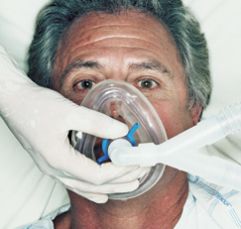 Easy ways to bounce back quickly…
Easy ways to bounce back quickly…
Most adults are familiar with that woozy state that occurs after undergoing anesthesia for surgery or even a screening procedure such as colonoscopy. In most cases, the aftereffects of the anesthetic wear off within a few hours. But not everyone is so lucky. Some people don’t metabolize drugs efficiently. An anesthetic can leave them feeling dizzy, weak, feverish and/or disoriented for days afterward.
This can occur with general anesthesia, which causes a temporary loss of bodily sensation and unconsciousness, or with regional or local anesthesia, which prevents you from feeling pain at the affected site while you remain awake.
Especially for older patients, general anesthesia increases risk for declines in mental function, including difficulty concentrating and memory loss. This condition, known as postoperative cognitive dysfunction (POCD), affects as many as 40% of patients over age 65 for one to three months, while some experience the condition for six months or more.
[expand title=”Read More” swaptitle=”Close”]
What you may not know: There are safe, effective ways to prepare for—and recover from—anesthesia. To minimize aftereffects and get back to normal more quickly, try…*
A HIGH-POTENCY MULTIVITAMIN
If you don’t take one already, start taking a high-potency multivitamin and mineral formula that provides a variety of nutrients, including at least 200 mg of vitamin C…25,000 international units (IU) of beta-carotene…and 22.4 IU of vitamin E each day, for at least two weeks before and after undergoing anesthesia. Many of these nutrients have antioxidant properties that play an important role in the body’s detoxification mechanisms that are facilitated by the liver.
A multivitamin and mineral formula also contains many nutrients that help eliminate heavy metals and other toxic compounds, including anesthetics, from the body. These include all of the B vitamins, but especially thiamine, B-6, folate and B-12…and key minerals such as zinc, magnesium and selenium.
These multivitamin and mineral formulas—usually labeled “high-potency”—are available at health-food stores. Follow instructions on the label.
MILK THISTLE
Milk thistle (Silybum marianum) promotes the body’s detoxification process by preventing the depletion of glutathione, a natural antioxidant found in the liver. The concentration of this antioxidant is reduced when you are exposed to chemicals, including anesthetics. When glutathione levels decline, liver cells become more susceptible to damage.
Milk thistle not only prevents the depletion of glutathione but also has been shown in laboratory studies to increase the level of this potent antioxidant by up to 35%.
Typical dose for milk thistle: 70 mg three times daily. Start taking it at least one week before surgery, and continue to take it for at least two weeks afterward.
Caution: Avoid milk thistle if you are allergic to plants in the ragweed family or have a history of hormone-related cancer, such as breast, uterine or prostate—milk thistle can affect hormone levels.
LIPOTROPIC FORMULAS
Lipotropic agents promote the flow of fat and bile to and from the liver. Used primarily as treatment for hepatitis, cirrhosis and chemical-induced liver disease, these agents increase levels of two important liver substances—glutathione and S-adenosylmethionine (SAMe).
Most major manufacturers of nutritional supplements offer lipotropic formulas. These formulas are typically rich in choline and methionine, two important nutrients for the liver, along with supportive nutrients and/or herbals.
Look for a supplement with a daily dose of 1,000 mg of choline and 1,000 mg of methionine. Begin taking it one week before and at least two weeks after surgery.
AN ANESTHESIA-RECOVERY DIET
If your body is recovering from anesthesia, steer clear of saturated fats, including meat and dairy (whey protein powder is a good protein alternative)…refined sugar…and alcohol—all of which can increase risk for cholestasis (slowed or blocked flow of bile, which makes it harder for the body to eliminate fat-soluble toxins like anesthetics).
On the other hand, a diet that is rich in dietary fiber—particularly water-soluble fiber—promotes bile secretion.
Good sources of water-soluble fiber: Pears, oat bran, apples and legumes. It’s also beneficial to eat vegetables from the cabbage family—especially broccoli, Brussels sprouts and cabbage—as well as artichokes, beets and carrots. All of these foods contain compounds that aid in detoxification.
There are also herbs and spices that will help you detox and recover from anesthesia—especially the antioxidants turmeric and cinnamon. In addition, you should eat foods that are rich in sulfur, which helps the liver clear toxins.
Good sulfur-rich foods: Garlic, onions and egg yolks. Add them to your diet whenever possible.
WATER
Not getting enough fluids—especially water—makes it difficult for your body to eliminate toxins. Bottled and filtered water are the best choices because they usually have fewer impurities, but drink tap water if it’s your only alternative.
A good goal for all times—but especially before and after undergoing anesthesia—is six to eight eight-ounce glasses of water each day.
Important: Don’t wait until you are thirsty to take a drink—by that time you will already be mildly dehydrated. Take water breaks throughout the day.
Good rule of thumb: Have a glass of water every two waking hours.
*Prior to any surgical procedure, be sure to discuss with your doctor any drugs and/or supplements you take. The recommendations in this article are safe for most people, but many supplements increase bleeding risk and/or may interact with some anesthetics.
[/expand]



